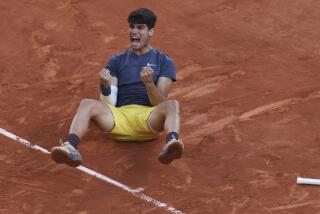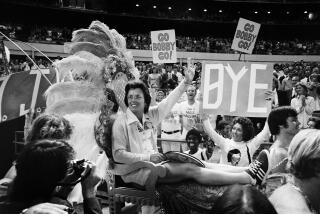Capriati’s Victory Is Special for All the Right Reasons
- Share via
The latest role for Jennifer Capriati, the teen prodigy turned teen burnout victim turned cautionary tale turned popular champion?
Jennifer Capriati, uniter.
The Australian Open champion quietly returned home during the midst of Super Bowl game-day mania in Tampa, Fla. She was with her father and coach, Stefano, and they had just completed the long journey from Melbourne, Australia, almost a metaphor for her long trip back from the abyss.
Waiting for them at the airport was her mother, Denise. Though Denise and Stefano Capriati have been divorced for a few years, the family came together in a close moment at the airport.
“We just hugged there for a long time,” Jennifer said. “She was so happy and I was happy and even my dad and my mom, they hugged too.
“Besides that, it was just relatively quiet. I mean, everyone was probably at the Super Bowl. It was just a quiet moment, but just a moment for us and then on the ride back home, we just talked about everything.”
She was the first player since Tracy Austin to beat the top two players in the world in straight sets in a Grand Slam event. Austin beat Martina Navratilova in the semifinals at the 1979 U.S. Open and Chris Evert in the final.
Capriati also is only the second player to beat Monica Seles, Lindsay Davenport and Martina Hingis to win a Grand Slam event. Steffi Graf defeated that trio in winning the final Grand Slam title of her career, the 1999 French Open.
On Thursday, Capriati did a series of interviews, a conference call and some of the network morning shows, speaking about the Australian Open and her future. Capriati’s next event is at Oklahoma City, starting Feb. 19, but she said the Indian Wells tournament in March is not on her schedule.
Just as she had been in Melbourne, Capriati was relaxed and candid during the long day of interviews, acknowledging on the CBS “Early Show” that she had grown “sick” of losing to the likes of Seles, Davenport and Hingis.
Capriati, 24, had never defeated Seles in a Grand Slam event and was 0-5 against Hingis before the Australian Open final.
This was her best tennis, even better than she’d played in winning the gold medal at the 1992 Olympics in Barcelona.
“The last three matches, I think I played well,” she said. “While I don’t think I could have played any better, let’s say, even in the final, but that is for right now I am playing my best tennis. I mean, my best tennis could just get better down the road.”
She has taken note of 30-year-old Andre Agassi, who won his seventh Grand Slam title with his latest Australian Open title.
“I think definitely there is still more of tennis to come from myself,” she said. “Just look at Andre, he is still going and he says he can go even stronger. That is an inspiration too. So definitely, I don’t think age makes any difference at all. Now we will see what this new confidence that I have from winning this tournament, what that will bring. We will see. With confidence, I mean, who knows what can happen?”
BUT WHAT ABOUT MEL?
Every so often, Venus Williams gets asked about history. At Wimbledon, it was Russian history. And one Australian was curious how much she knew about the country, looking for a new angle shortly after Venus and Serena had completed their career doubles Grand Slam.
Venus obliged, summing it up in two succinct sentences:
“Australia was started as a penal colony in the beginning,” she said. “They went on to become patriotic Australians, got their own accent, moved away from the British and here we are.”
The discussion then moved from Australia to France. Specifically, the on-court striptease of Frenchman Arnaud Clement, who took off his shirt, shoes and socks, after he’d taken out Yevgeny Kafelnikov in the quarterfinals.
“It’s good he didn’t take it any further,” she said.
QUESTIONS, QUESTIONS
Todd Martin was curious. He’d spent a lot of time watching CNN, taking notice of White House press briefings and other news conferences. He’d heard reporters stating their names and affiliations.
Why didn’t this take place in tennis?
He mentioned this in an informal discussion during a media commission meeting in Melbourne at the Australian Open. He jokingly introduced himself, “Todd Martin, Lansing State Journal.”
At Martin’s suggestion, an experiment was launched, with mixed results. Tim Henman looked surprised when British reporters, whom he had known for years, started introducing themselves. Anna Kournikova was confused and seemed to think it was some sort of media trick.
Martina Hingis introduced herself, leaning forward, “Martina Hingis, from Switzerland.”
Pete Sampras was asked by an Italian reporter whether he wanted to be a father during his tennis career or would he prefer to wait. Hey, if the guy had the guts to say his name, why not answer?
“I’d prefer to wait, but I don’t mind surprises,” Sampras said, laughing.
By the end of the event, however, much of the media had returned to previous form. After all, tennis isn’t the White House, and Wolf Blitzer and John King haven’t been spotted around the courts.
More to Read
Go beyond the scoreboard
Get the latest on L.A.'s teams in the daily Sports Report newsletter.
You may occasionally receive promotional content from the Los Angeles Times.











